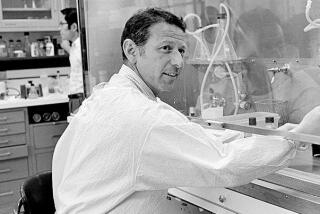Working to Unlock a Genetic Mystery
- Share via
If a Nobel Prize is ever awarded for research on the genetics of cancer, the most likely recipient, many scientists agree, is Bert Vogelstein of the Johns Hopkins University School of Medicine in Baltimore. His research on the development of colorectal cancer has provided the first clear understanding of the complex pathway by which a tumor develops.
“Dr. Vogelstein’s work is beautiful science with enormous potential impact,” said molecular biologist James Watson of the Cold Spring Harbor Laboratory, himself a Nobel laureate. “His work will lead to a much more precise diagnosis of the stages of colon cancer, one of the most wretched diseases which afflicts mankind.”
Oncologist Alan Sartorelli of the Yale Comprehensive Cancer Center said: “Dr. Vogelstein revolutionized the way we think about colon cancer. This new knowledge will help form the basis for development of new and more specific treatments.”
Eventually, it could lead to early diagnosis of colon cancer while it is still surgically curable and to tests that predict whether a cancer is likely to spread.
Vogelstein, 42, received a degree in mathematics from the University of Pennsylvania in 1970. As an undergraduate, he also received a prize for achievement in Semitic languages. Four years later, he received his MD from Johns Hopkins, then served as an intern and resident in pediatrics. After two years of research at the National Cancer Institute, he returned to Johns Hopkins.
His insights were an outgrowth of his decision to use human tumor tissue, rather than animal tumors, for study. The ready accessibility of colorectal tumors allowed him to study them at all stages of their growth.
Applying the newly developed techniques of genetic engineering to the tumor tissue, he and his colleagues have so far been able to identify the presence of at least three tumor-suppressor genes and one tumor-promoting gene that are involved in colorectal cancer.






